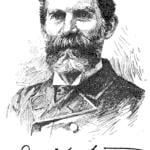The Ten Commandments, delivered by Moses to the Israelites at Mount Sinai, represent a codification of God’s will that his people be perpetually governed by love. The commandments start with God’s insistence that the Israelites worship no other gods, nor make carved images, because, God explains, “I, the Lord your God, am a jealous God” (Exodus 20:2-5). It’s a jarring note on which to begin, but, on reflection, it makes perfect sense since what God is going to require of the Israelites, first and foremost, is their love. He promises to show mercy to “those who love Me and keep My commandments” (20:6). But to love God as the only god is necessarily to keep His commandments. The effect necessarily proceeds from its cause. To love God as the Creator of the world is necessarily to love His creation. Consider: The way you look at your beloved’s painting (let’s say) is different from the way you look at a stranger’s painting; you esteem it because it is made by your beloved; love transforms your gaze. (It’s the reverse effect of what happened to Adam and Eve after they ate the fruit.) In requiring unrivaled, unambiguous, unyielding love from the Israelites, therefore, God is requiring them to love both Himself and, through Him, that which He has made—creation in its entirety. Once that primary moral obligation is met, the rest follow.
Love is the great simplifier of the Judeo-Christian tradition. It is the root of justice, mercy and humility. Thus, the Old Testament prophet Micah sums up the demands made by God on the Jewish people:
He has shown you, O man, what is good;
And what does the Lord require of you
But to do justly,
To love mercy,
And to walk humbly with your God? (Micah 6:8)
The common quality among the requirements “to do justly,” “to love mercy” and “to walk humbly with your God” is a steadfast dedication to that which is beyond the self—in effect, a categorical imperative to conduct yourself in the spirit of caritas. It is a transformative spirit. Judaism, compared with Christianity, is less a doctrinal faith (notwithstanding the 13 principles of Maimonides) than a cultural heritage, a way of being. To be a good Jew is to live the life described by the prophet Micah. But to live that life is also to be transformed by love, to embody in your person the covenant of Abraham, Isaac and Jacob.
According to the Talmud, when the great Jewish scholar Hillel was challenged by a non-believer to teach him the entirety of the Torah—in effect, the Ten Commandments listed in Exodus, plus the additional 613 commandments laid out elsewhere in the first five books of the Bible—while he stood on one foot, Hillel replied, “What is hateful to yourself, do not do to your fellow man. That is the whole Torah; the rest is just commentary. Go and study it.” Hillel was referring back to the first formulation of what would become known as the Golden Rule: “You shall love your neighbor as yourself” (Leviticus 19:18). But how is it possible to love your neighbor as yourself? The answer comes in the next four words: “I am the Lord.” In other words: Love your neighbor as yourself because you love Me, and because your neighbor is, no less than you are, My creation.
Likewise, in the New Testament, when Jesus is challenged by a Pharisee to name the great commandment in Jewish law, he replies:
“You shall love the Lord your God with all your heart, with all your soul, and with all your mind.” This is the first and great commandment. And the second is like it: “You shall love your neighbor as yourself.” (Matthew 22:37-39).
It’s worth noting that neither of the commandments Jesus cites comes from the original stone tablets carried down Mount Sinai by Moses; rather, the specific citations are taken from later refinements mentioned in Deuteronomy (6:5) and, again, in Leviticus (19:18). It’s also worth noting that both require, as their actuating principle, love. Yet Jesus insists, “On these two commandments hang all the Law and the Prophets” (Matthew 22:40).
The reduction is critical. For Jesus claims that he honors the law of Moses:
“Do not think that I came to destroy the Law or the Prophets. I did not come to destroy but to fulfill. For assuredly, I say to you, till heaven and earth pass away, one jot or one tittle will by no means pass from the law till all is fulfilled. Whosoever therefore breaks one of the least of these commandments, and teaches men so, shall be called least in the kingdom of heaven; but whoever does and teaches them, he shall be called great in the kingdom of heaven” (Matthew 5:17-19).
Now, at first glance, Jesus’s claim to fulfill the law of Moses might be suspect since he repeatedly seems to violate the commandment to do no work on the Sabbath (Exodus 20:8-11). To the dismay of the Jewish elders, Jesus feeds his followers (Luke 6:1-5) and performs healings (Luke 13:10-15 and John 9:1-16) in apparent disregard of the rule. But if the totality of Jewish Law amounts to God’s command to love Him and His creation, then feeding the hungry and healing the sick are justified even on the Sabbath because they are acts of love.
Jesus is saying that the question of commandment-following and commandment-breaking isn’t as straightforward as it might seem. What must be considered is not only what you are doing but why you’re doing what you’re doing. Doting grandparents chase children around the house, tickling them; so do child molesters. The morality of the act changes radically according to the intention of the actor. Judging morality entails knowing, at least to a certain degree, what the actor had in mind.
Sexual morality, likewise, is ultimately a function of the intention of the partners. The expression of love, if it’s genuine love, and it’s rooted in love of God, is transformative, almost sacramental. It transforms both the actor and the act, redeems what might otherwise be irredeemable. Divorced from love, sexual relations fail to honor that which is made in the image of God. But, broadly speaking, the Judeo-Christian tradition recognizes the righteousness of sex, even non-procreative sex, within the context of a loving, conjugal union.
It’s as close as we get in this life to Eden.
Mark Goldblatt teaches religious history at Fashion Institute of Technology of the State University of New York. His most recent books are Right Tool for the Job: A Memoir of Manly Concerns (Liberty Island Press) and Finding the Worm (Random House). Twitter: @markgoldblatt













